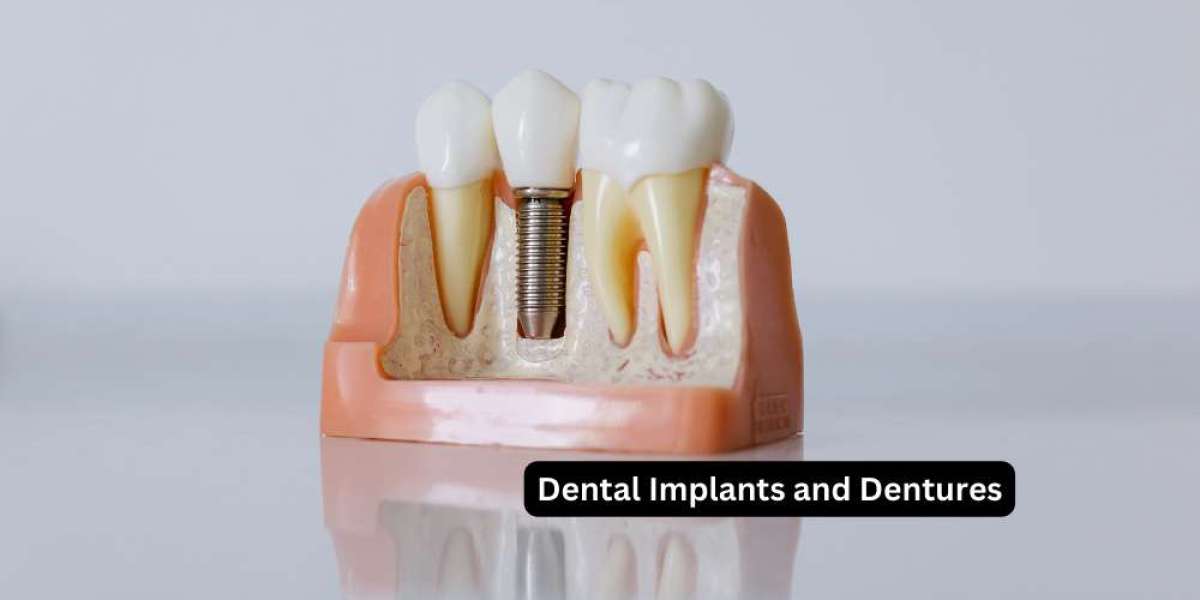Dental Implants and Dentures: A Comprehensive Guide
In the realm of restorative dentistry, dental implants and dentures are two popular solutions for replacing missing teeth. Whether due to aging, injury, or dental disease, missing teeth can greatly affect one’s ability to speak, chew, and smile confidently. Both dental implants and dentures offer viable solutions for restoring function and aesthetics. However, each option has distinct benefits, challenges, and considerations. This guide will explore Dental Implants and Dentures in depth, covering their types, benefits, drawbacks, and which might be right for you.
Table of Contents
- What Are Dental Implants?
- Types of Dental Implants
- Benefits of Dental Implants
- Drawbacks of Dental Implants
- What Are Dentures?
- Types of Dentures
- Benefits of Dentures
- Drawbacks of Dentures
- Dental Implants vs. Dentures: Which One is Right for You?
- Conclusion
1. What Are Dental Implants?
Dental implants are artificial tooth roots that are surgically placed into the jawbone to replace missing teeth. Made from biocompatible materials such as titanium, dental implants fuse with the bone over time in a process called osseointegration, providing a stable and durable foundation for artificial teeth (crowns). Dental implants are designed to mimic the look, feel, and function of natural teeth.
Unlike dentures, which are removable, dental implants are permanent solutions that function just like natural teeth. They are ideal for individuals who have lost one or more teeth and want a long-term, stable solution.
2. Types of Dental Implants
There are several types of dental implants, and the best choice for you will depend on your specific dental needs.
a) Endosteal Implants
Endosteal implants are the most common type of dental implant. They are placed directly into the jawbone and typically shaped like small screws or cylinders. Once the implant has fused with the bone, a crown is attached to the top of the implant.
b) Subperiosteal Implants
Subperiosteal implants are used for patients who have insufficient bone height in the jaw to support an endosteal implant. These implants are placed on top of the jawbone, beneath the gum tissue. They provide an alternative when bone grafting is not an option.
c) All-on-4 Implants
This type of dental implant allows for the replacement of an entire arch of teeth (upper or lower) using only four implants. The implants are strategically placed at certain angles to maximize bone stability, and a fixed bridge is attached.
3. Benefits of Dental Implants
Dental implants offer a wide range of benefits for patients who are suitable candidates.
a) Durability and Longevity
Dental implants are known for their long lifespan. With proper care and maintenance, they can last a lifetime, unlike bridges or dentures that may require replacement every 5 to 10 years.
b) Natural Look and Feel
Because dental implants fuse with the bone, they provide a natural feel and appearance. Unlike dentures, which can shift or slip, implants offer a stable and permanent solution that looks like real teeth.
c) Improved Function
Implants restore full chewing power, allowing individuals to eat almost anything without discomfort or limitations. They also help preserve the integrity of the jawbone, preventing bone loss that often occurs after tooth loss.
d) Improved Oral Health
Unlike dental bridges, which require the alteration of adjacent teeth, dental implants do not compromise the health of surrounding teeth. They also help preserve the structure of the jawbone, which is critical for maintaining facial aesthetics and functionality.
4. Drawbacks of Dental Implants
While dental implants are a highly effective solution, they do have some drawbacks that need to be considered.
a) Surgical Procedure
Dental implant placement requires surgery, which involves potential risks such as infection, nerve damage, or complications with the bone graft. The process is typically done in stages, and full healing can take several months.
b) Cost
Dental implants are typically more expensive than dentures and other alternatives, primarily due to the surgical procedure and materials used. The cost can vary depending on the complexity of the case and the need for additional treatments like bone grafting.
c) Not Suitable for Everyone
Some individuals may not be good candidates for dental implants, particularly those with insufficient bone density or active periodontal disease. A thorough evaluation by a dentist or oral surgeon is necessary to determine eligibility.
5. What Are Dentures?
Dentures are removable prosthetic devices used to replace missing teeth. Made from acrylic resin, porcelain, or a combination of materials, dentures are designed to mimic the appearance of natural teeth. They come in two primary types: full and partial dentures.
Full dentures are used when all the teeth in the upper or lower jaw are missing, while partial dentures are used when some natural teeth remain. Dentures are custom-made to fit snugly against the gums and are typically held in place with suction or denture adhesive.
6. Types of Dentures
a) Full Dentures
Full dentures are used when all of the natural teeth are missing from the upper or lower jaw. They are designed to fit comfortably over the gums, providing a natural-looking set of teeth.
b) Partial Dentures
Partial dentures are used when some natural teeth remain. These dentures are attached to the remaining teeth using metal clasps or precision attachments. They help fill gaps left by missing teeth and restore the appearance and functionality of the mouth.
c) Implant-Supported Dentures
Implant-supported dentures combine the stability of dental implants with the convenience of dentures. These dentures are secured in place with implants, making them more stable than traditional removable dentures.
7. Benefits of Dentures
Dentures offer several advantages for those who are looking to restore missing teeth.
a) Affordable
Compared to dental implants, dentures are generally more affordable and can be a more budget-friendly option for replacing missing teeth.
b) Quick and Non-Invasive
The process of getting dentures is less invasive than dental implants. Impressions of your mouth are taken, and the dentures are custom-made to fit. The process usually takes a few weeks to complete.
c) Improved Appearance
Dentures can restore the appearance of a full set of teeth, improving facial aesthetics and enhancing self-confidence.
8. Drawbacks of Dentures
While dentures provide many benefits, they also have some drawbacks that should be considered.
a) Discomfort and Adjustment Period
Dentures may feel uncomfortable at first, and they can cause irritation to the gums as the mouth adjusts to the new appliance. It may take some time to get used to speaking and eating with dentures.
b) Maintenance
Dentures require regular cleaning and care to ensure they remain in good condition. They also need to be replaced periodically, usually every 5 to 7 years.
c) Potential for Slippage
Traditional dentures can sometimes slip out of place, particularly while eating or speaking. Although denture adhesives can help, they may not offer the same level of stability as dental implants.
9. Dental Implants vs. Dentures: Which One is Right for You?
Choosing between dental implants and dentures depends on several factors, including your dental health, budget, and personal preferences.
Dental Implants are best for those who want a permanent solution and are in good overall health with enough bone density to support implants. They are ideal for individuals who want a natural-looking, comfortable, and functional replacement for missing teeth.
Dentures are a better option for individuals who need a more affordable solution or are not good candidates for surgery. Dentures are ideal for people who have lost all or most of their teeth and need a non-invasive, quick solution.
Consulting with your dentist or oral surgeon is essential to determine which option is best for you.
10. Conclusion
Both dental implants and dentures are effective solutions for replacing missing teeth, each with its unique advantages and drawbacks. Dental implants offer a permanent, natural-looking solution with greater stability and long-term durability, but they require surgery and are typically more expensive. Dentures, on the other hand, are more affordable and quicker to get but may require more maintenance and adjustment.
Ultimately, the right choice depends on your personal needs, health, and budget. By consulting with a skilled dentist or oral surgeon, you can make an informed decision that will restore your smile and improve your quality of life.








